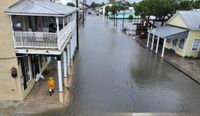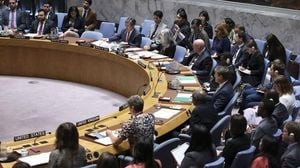Opposition is mounting across Florida to a new law, Senate Bill 180 (SB 180), that was intended to bolster disaster recovery but has quickly become a lightning rod for controversy among local officials, environmental advocates, and residents. Signed by Governor Ron DeSantis in 2025 and sponsored by Pinellas County Republican Nick DiCeglie, SB 180 was initially hailed as a much-needed fix to help homeowners recover more quickly from the devastation wrought by hurricanes like Debby, Helene, and Milton in 2024. But as the law’s effects ripple through communities, critics say it’s causing more harm than good, undermining local authority and stoking fears about unchecked development and environmental risk.
At its core, SB 180 was designed to streamline the post-disaster rebuilding process. According to reporting from multiple Florida news outlets, the law set out to provide homeowners with clear and expedited permitting requirements, aiming to ensure that families could repair their storm-damaged homes without facing increased tax bills. The law also mandated improvements in disaster management planning, emergency resource coordination, financial transparency, and reporting across state and local government disaster management agencies. In the words of DiCeglie, the law was meant to address failures in local government responsiveness during the 2024 hurricane season. "Make sure that the residents know what that plan is when it comes to permitting," DiCeglie told the St. Petersburg City Council. "When that plan was not in place [last year], and folks were looking and knocking on the door at City Hall and nobody is answering the door. Nobody is answering the phone calls. The fact that local governments are not answering the call of their taxpayer to me was a complete disgrace and an ultimate failure."
Yet, buried within the law is a provision that has become the focal point of fierce opposition. SB 180 bars local governments from enacting new land-use or development regulations deemed "restrictive or burdensome," even if those regulations have nothing to do with disaster recovery. This applies retroactively from August 2024 through October 2027 to every county and municipality listed in the Federal Disaster Declaration for Hurricanes Debby, Helene, or Milton in 2024. And it’s not just bureaucratic red tape—any person can notify a local government of an alleged violation, giving that government just 14 days to correct the issue before a lawsuit can be filed. If the government repeals the contested restriction, the case is dropped; if not, litigation proceeds.
Paul Owens, president of the nonprofit advocacy group 1000 Friends of Florida, minced no words in a press release last week. "This legislative overreach ties the hands of communities striving to address urgent environmental, growth management, and disaster resiliency challenges," he stated. "By undermining local authority, SB 180 puts Floridians at greater risk from flooding, pollution, and unchecked sprawl. We urge lawmakers to act swiftly to repeal these harmful provisions in 2026." According to the group, the law’s sweeping language is already having unintended and far-reaching effects, far from its stated intent to help storm victims.
Perhaps the most high-profile casualty of SB 180 so far is Orange County’s Vision 2050 comprehensive plan. Developed over eight painstaking years, Vision 2050 was intended to guide the county’s growth, discourage suburban sprawl, protect rural areas, and address issues like affordable housing, transportation, and environmental protections. But on August 1, 2025, the Florida Department of Commerce notified Orange County that Vision 2050 violated SB 180 and was "null and void." James D. Stanbury of the Commerce Department’s Bureau of Community Planning and Growth cited the law’s language, which prohibits counties and cities listed in the disaster declaration from adopting "more restrictive or burdensome amendments to its comprehensive plan." Orange County officials, caught off guard, announced plans to meet with department officials to "gain a clearer understanding of their concerns and to receive guidance on next steps."
This isn’t just an Orange County problem. Local governments across the state are scrambling to adapt to the new legal landscape. On August 5, 2025, the Manatee County Commission unanimously authorized staff to collaborate with Pasco County officials to draft a legislative proposal aimed at fixing the problems SB 180 has created for local governments. Volusia County council members, for their part, voted in early August to request changes to the law for the 2026 legislative session, seeking relief from what many see as a heavy-handed state intervention.
The pressure is on. Deltona City Commissioner Dori Howington expressed deep concern about the mounting number of lawsuits challenging local ordinances. "What’s happening is, we’re seeing lawyers lining up to basically attack ordinances that developers have not liked seeing implemented, and as a result, the lawsuits are stacking up against us," she said. "Anything that you do regarding land use, building codes—anything can be challenged." Howington urged for faster legislative action, warning that waiting until next year for Tallahassee to address the issue could leave local governments vulnerable and communities at risk.
The legal community is taking notice. Fort Lauderdale attorney Jamie Cole has reached out to several local governments about the possibility of filing lawsuits to challenge some of SB 180’s provisions. While Cole himself was unavailable for comment, an associate at his law firm told the Phoenix, "We are hearing from many cities and counties from all over the state, concerned about the impacts of SB 180 and considering whether to join in a lawsuit." The Deltona City Commission, according to Howington, hasn’t yet voted on whether to join that coalition but is likely to consider it soon.
Supporters of SB 180, including DiCeglie, maintain that the law was never intended to stifle local innovation or environmental stewardship. Instead, they say, it was a response to the frustration and confusion experienced by residents after last fall’s hurricanes. DiCeglie admitted that the regulatory language was "very broad," but argued that the goal was to ensure local governments were accountable and responsive in times of crisis. "Make sure that the residents know what that plan is when it comes to permitting," he emphasized. For DiCeglie and others, the failures of some local governments to answer the needs of their communities in the wake of disaster justified strong action from the state.
But for many local officials, environmental advocates, and even some residents, the law’s unintended consequences are now impossible to ignore. The threat of litigation, the nullification of long-term planning efforts like Vision 2050, and the inability to enact new rules to manage growth and protect the environment have left many wondering if the cure has become worse than the disease. As lawsuits begin to stack up and local governments scramble for legislative fixes, the debate over SB 180 is likely to intensify in the months ahead.
With the 2026 legislative session on the horizon, all eyes are on Tallahassee to see whether lawmakers will heed the calls for repeal or reform—or whether the controversy surrounding SB 180 will continue to cast a long shadow over Florida’s efforts to balance disaster recovery with responsible growth and local control.




